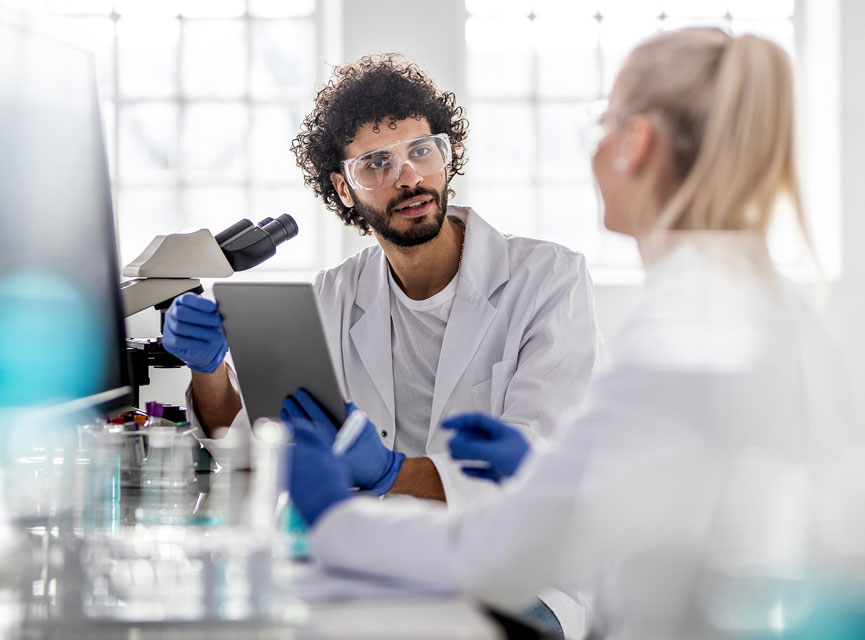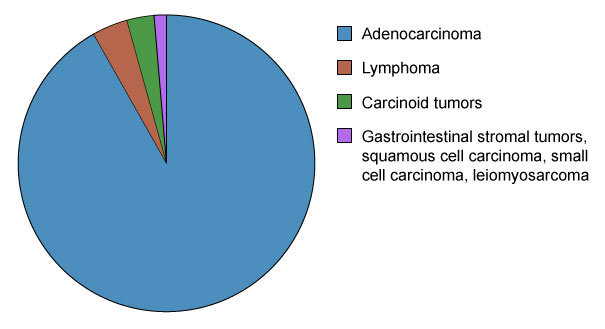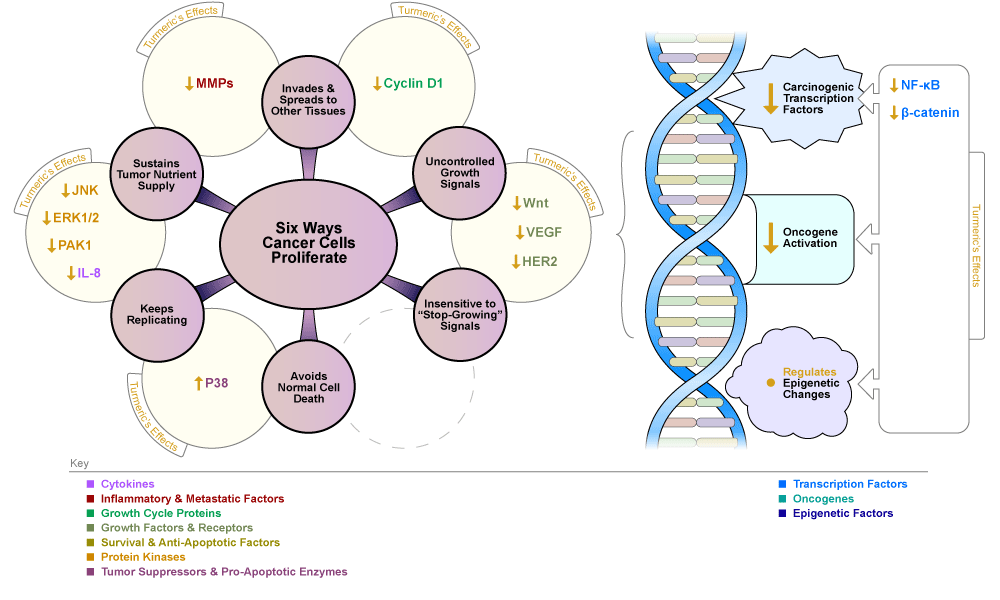Turmeric Compounds Could Help Fight Gastric Cancer

Although stomach cancer is no longer a leading cause of cancer-related deaths in America, it continues to be worldwide. Because it typically takes many years to develop, it's most common in people aged 65 and older. The good news is turmeric's antibacterial properties may help reduce the risk of stomach cancer. (vi.211, 303)
There are several types of stomach cancers: (vi.303)

Stomach Cancer Types by Prevalence
Causes and Risk Factors for Gastric Cancer
Infection with Helicobacter pylori bacteria is thought to be a major cause of stomach cancer. H. pylori are considered a group 1 carcinogen, and can also cause stomach ulcers. Interestingly, however, rates of gastric cancer in India are low despite high rates of H. pylori infection. (vi.303, 304)
Another known cause of stomach cancer is hereditary diffuse gastric cancer syndrome. Though it is a rare genetic condition, people with have a family history of stomach cancer and an individual history of invasive lobular breast cancer may be at risk for it. (vi.211, 303)
- Lack of appetite
- Unexplained weight loss
- Stomach pain or discomfort (usually upper belly)
- Heartburn
- Indigestion
- Abdominal swelling
- Anemia
- Nausea and/or vomiting
Other risk factors associated with stomach cancer include:
- High amounts of nitrates and nitrites in the diet (vi.219, 303)
- Hispanic ethnicity. (vi.303)
- Stomach lymphoma. (vi.303)
- Smoking tobacco. (vi.303)
- Excess body weight. (vi.303)
- Gastric surgery. (vi.303)
- Vitamin B12 deficiency caused by pernicious anemia. (vi.303)
Turmeric Activity against Gastric Cancer
Population studies suggest that people who use lots of turmeric in their diet have lower incidence of cancer. This may be due to several factors, including turmeric's antioxidant compounds. In fact, in a Swedish study, higher dietary intake of plant-based antioxidants was associated with a lower risk of gastric cancer. (vi.133)
Turmeric compounds could also help prevent and treat conditions associated with metabolic syndrome, which are also associated with increased risk of gastric cancer. These include obesity, diabetes, and heart disease. (vi.213, 234-237)
Specific Turmeric and Turmeric Compound Effects
Turmeric contains phytochemical compounds and nutrients that research suggests can have beneficial effects against stomach cancer—especially curcumin. In addition to antioxidant properties, lab studies show that turmeric's curcumin compounds block the formation of H. pylori biofilms. This may help counteract recurrent or chronic infections from the carcinogenic bacteria and reduce antibiotic resistance. (vi.211, 305)
Many of turmeric's compounds have anti-inflammatory properties. Since H. pylori infections are difficult to eradicate, scientists suggest reducing the inflammation caused by H. pylori that can lead to gastric cancer may be a way an important way to help prevent it. (vi.74, 103, 213, 305)
Reducing the Impact of Cancer-Promoting Proteins
Studies show that turmeric's curcumin compounds can also significantly affect many of the proteins involved in stomach cancer. Some of curcumin's activities are similar to chemotherapy drugs (such as Gleevec®). (vi.114)
For example, curcumin suppresses the activity of PAK1 proteins. These kinases directly promote invasiveness of cancer cells. At the same time PAK1 stimulate cell cycle proteins and tumor growth. Molecules such as turmeric's curcumin and Gleevec® that inhibit PAK1 could thus help stop stomach cells from growing and spreading. (vi.114)
Other turmeric compound activities include:
| Turmeric Compound | Effects |
|---|---|
|
Question: How can calebin-A help fight gastric cancer? Answer: Calebin-A is a protein found in turmeric. Research shows it has the following beneficial effects against stomach cancer:
|
|
|
Curcumin (vi.74) |
Question: How can curcumin help fight stomach cancer? Answer: Studies show curcumin has the following beneficial effects against gastric cancer:
|
|
Question: How can eugenol help fight stomach cancer? Answer: Research indicates eugenol has the following beneficial effects against gastric cancer:
|
|
|
Question: How can limonene help fight gastric cancer? Answer: Research shows limonene has the following beneficial effects against stomach cancer:
|
|
|
Question: Can quercetin help fight gastric cancer? Answer: In a population study involving people in Holland, eating ½ and onion or more per day was linked with 50% lower risk of gastric cancer. Onions are known to be particularly rich in quercetin. (vi.250) This study is supported by pre-clinical research that shows quercetin also reduces gastric cancer cell growth. Scientists suggest it probably does so by interfering with the cancer cell's ability to replicate. (vi.131) |
|
|
Turmeric |
Question: Can turmeric help fight gastric cancer? Answer: In animal studies, 2-5% dietary turmeric significantly blocked the formation of stomach tumors in a dose-dependent way. Adding the turmeric compound curcumin to the diet reduced the risk of developing glandular stomach cancer in a dose-dependent manner. In those that did develop tumors and precancerous lesions, the number was significantly lower than untreated groups. (vi.16) Twice daily turmeric supplements (500 mg each) reduced levels of HER2 in some patients with HER2+ gastric cancer. (vi.309) |
|
Question: How can vitamin C help fight gastric cancer? Answer: Vitamin C is a potent antioxidant that quenches DNA-damaging free radicals. (vi.270) Studies show vitamin C also blocks formation of cancer-causing substances from nitrates in processed meats. (vi.270) |
Some of the effects of turmeric compounds on factors involved in gastric cancer are indicated in the diagram below: (vi.82, 85, 103, 114, 171, 305, 306)

How Turmeric's Compounds Stop Gastric Cancer Cells
Join the 1000s of People Who Are Discovering the Benefits of Turmeric.

Healthceuticals® Turmeric Curcumin Complex
100% Certified
Organic ingredients
- Organic Turmeric Extract - standardized to 95% curcuminoids.
- Organic Whole Turmeric - provides full spectrum antioxidant, anti-inflammatory turmeric benefits, including turmerones and numerous vitamins, minerals, and phytonutrients
- Organic Black Pepper Extract - standardized to 95% piperine; dramatically enhances bioavailablity.
- Organic Phospholipids - markedly improve absorption.
- Organic Ginger - works synergistically with turmeric to provide more powerful benefits.
- Absolutely FREE of potentially harmful additives and fillers such as magnesium stearate.



